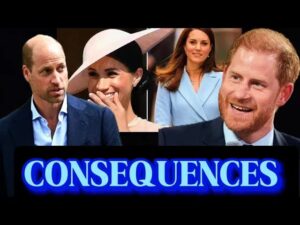The House of Windsor, once a beacon of unity and resilience, now finds itself in turmoil.
At the center of this familial discord are Prince William and Prince Harry, whose once-strong bond has been shattered beyond recognition.
These brothers, who shared an unbreakable connection forged in the aftermath of their mother Princess Diana’s tragic death, are now divided by a deep chasm filled with resentment and misunderstanding.
Harry’s marriage to Meghan Markle, an American actress with biracial heritage, intensified the existing tensions within the royal family.
Meghan’s modern outlook and departure from royal norms stirred the pot, culminating in the couple’s explosive interview with Oprah Winfrey in 2021.
During this candid conversation, Harry made serious allegations against the royal family, including claims of racism and neglect.
Meghan’s heartfelt revelations about her mental health struggles further painted a bleak picture of life within the palace, marking a pivotal moment that solidified the rift between the two brothers.
As Harry and Meghan stepped away from royal duties, the spotlight shifted to Prince William.
As the future king, he bore the heavy burden of upholding the monarchy’s reputation.
Many anticipated that he would reach out to his brother to mend fences.
Yet, William’s response has been notably muted, with his silence interpreted by many as indifference.
This lack of engagement has cast a shadow over his public image, raising questions about his ability to lead a monarchy that resonates with the modern populace.
In stark contrast to William’s reticence, Harry and Meghan have adopted a refreshingly open approach to their lives post-royalty.
Free from the constraints of royal expectations, they have chosen to share their personal experiences candidly.
Their willingness to discuss issues like mental health, racism, and the pressures of fame has resonated with audiences worldwide, allowing them to connect deeply with people who see their own struggles reflected in the couple’s narrative.
Harry and Meghan have emerged as champions for various causes, advocating for mental health awareness and environmental sustainability.
Their popularity has soared, especially among younger generations, who often view them as relatable figures.
This burgeoning admiration starkly contrasts with the growing skepticism surrounding Prince William, who appears increasingly disconnected from the evolving concerns of society.
The implications of this sibling rivalry stretch far beyond mere family disputes.
The British monarchy, an institution steeped in history and tradition, heavily relies on public perception for its survival.
As the heir apparent, William is expected to embody stability and continuity, yet the ongoing conflict with Harry and the negative press surrounding his handling of the situation threaten to undermine his authority and weaken the monarchy’s standing with the British public.
A monarch without the support of their subjects is a precarious position.
History serves as a reminder of rulers who lost favor with their people, leading to unrest and even the downfall of entire dynasties.
For the sake of the crown’s future, William must find a way to heal the rift with Harry and restore his public image, or risk facing dire consequences for both himself and the institution he represents.
At the core of this royal drama lies a significant tension: the clash between tradition and modernity.
The British monarchy, despite its grandeur, is deeply rooted in the past.
William, raised under the weight of this legacy, seems caught between these two worlds.
He feels the pull of duty and tradition while also recognizing the need for the monarchy to adapt to remain relevant in a rapidly changing world.
Public sentiment surrounding the royal rift is sharply divided, reflecting the complexities of tradition versus modernity.
On one side are staunch supporters of the Crown, who view Harry and Meghan’s exit as a betrayal of royal values.
For them, William’s silence signifies respect for tradition and a dignified stance against what they perceive as unwarranted criticism.
Conversely, there are those who empathize with Harry and Meghan, seeing them as victims of an archaic system that prioritizes protocol over compassion.
Queen Elizabeth II has long been a symbol of stability, navigating the changing tides of her reign with grace.
However, the current discord within her family poses a significant threat to her legacy.
Her successors will inherit a monarchy shadowed by scandal and division, complicating their efforts to secure its future.
Beneath the titles and the pomp, two brothers are grappling with profound hurt and loss.
Once united by shared grief, William and Harry now find themselves on opposite sides of an insurmountable divide.
Their estrangement is rooted in complex factors, including their contrasting personalities and the immense pressures of royal life, all magnified by the loss of their mother at a young age.
The contrasting leadership styles of William and Harry offer a fascinating glimpse into modern royal dynamics.
While William embodies a traditional, stoic approach, Harry has embraced emotional intelligence and authenticity.
The challenge for William lies in reconciling his duty to uphold royal traditions with the pressing need for a more empathetic and relatable leadership style that resonates with today’s society.
